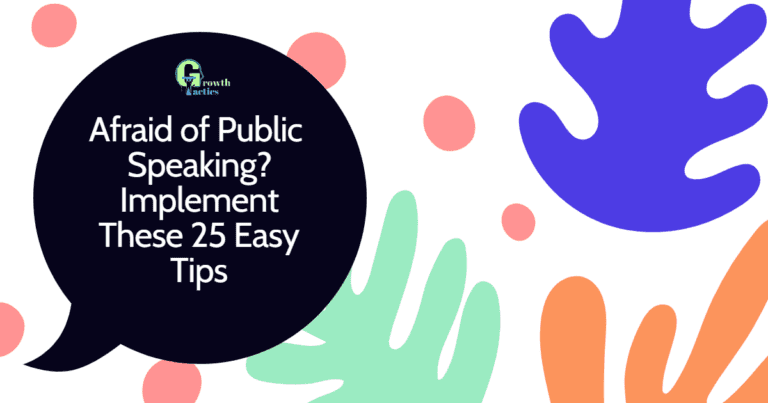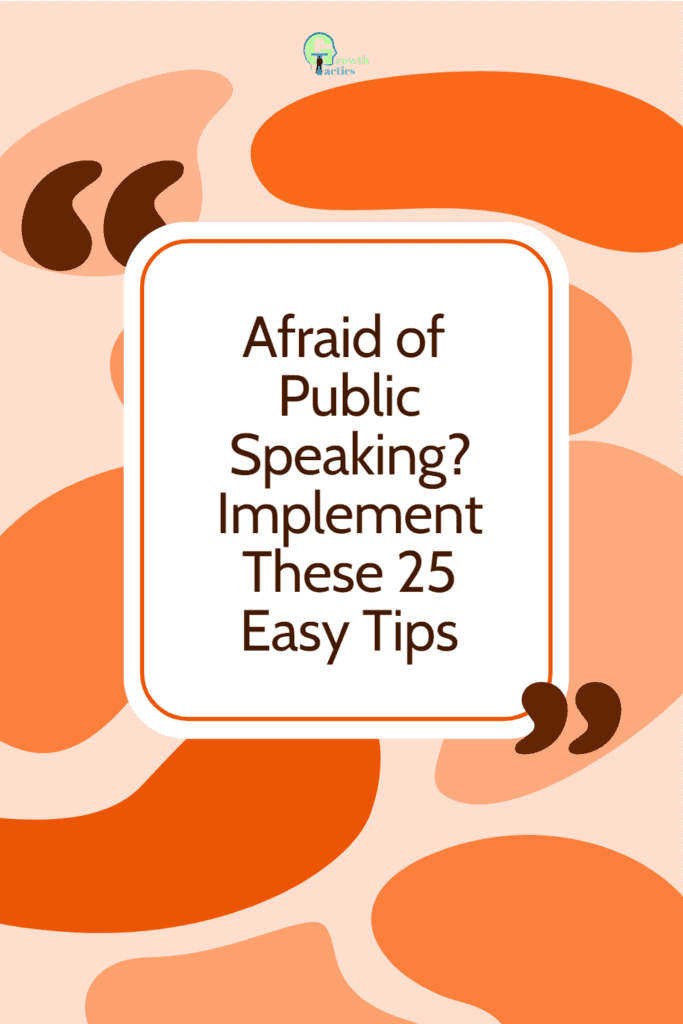Imagine standing in front of a large audience, the spotlight shining down on you, and all eyes eagerly awaiting your words. Public speaking – it’s a skill that can simultaneously ignite excitement and instill fear in the hearts of many. Whether you’re a student presenting in class, a professional delivering a business pitch, or a social activist addressing a crowd, the ability to convey your thoughts confidently and effectively can make or break your message.
While we can’t eliminate all the jitters associated with public speaking, we can help you prepare and improve your performance with these 25 essential tips:

Jump To Section
Before the Speech
Understand the Audience
The first step towards successfully connecting with an audience is understanding who they are and what they want. Take some time to research your target audience, their interests, and their level of knowledge on your topic. This will allow you to tailor your speech to cater to their needs and ensure the relevance of your message.
Define Clear Objectives
Before stepping onto the stage, it’s crucial to define clear objectives for your speech. Ask yourself: What do you want to achieve with your presentation? Whether it’s to educate, persuade, inspire, or entertain, setting specific goals will help you stay on track and deliver a focused message.
Master the Topic
No matter how charismatic a speaker you are, your credibility lies in your knowledge. Master your topic by conducting thorough research, gathering reliable sources, and becoming an expert in the subject matter. This will not only instill confidence in yourself but also enable you to handle any questions or challenges from the audience with grace.
Organize the Presentation
A well-organized speech is the key to maintaining your audience’s attention. Structure your presentation with a clear introduction, body, and conclusion. Start with a captivating opening that grabs their attention, then provide a logical flow of information in the body of your speech. Finally, conclude by summarizing your main points and leaving the audience with a memorable takeaway.
Utilize Visual Aids Effectively
We live in a visual world, and incorporating effective visual aids can significantly enhance your message. When choosing visuals, select relevant and impactful images or graphs that support your points without overwhelming the audience. Keep them clear, concise, and easy to understand, ensuring that they enhance your speech without becoming a distraction.

Practice and Rehearse
Practice makes perfect, and this holds true for public speaking as well. Allocate ample time to rehearse your entire speech. Familiarize yourself with the flow, timing, and transitions. Practice in front of a mirror or record yourself to evaluate your body language, voice modulation, and overall delivery. Seek feedback from trusted individuals who can provide constructive criticism to help you refine your performance.
Manage Nervousness
It’s normal to feel nervous before public speaking, but it’s essential to manage those nerves to ensure a confident and engaging delivery. Try relaxation techniques such as deep breathing or visualization exercises to calm your nerves. Additionally, pay attention to your body language – stand tall, maintain eye contact, and use gestures naturally to establish a connection with your audience.
Engage the Audience
An engaged audience is a receptive audience. Capture their interest from the beginning by using attention-grabbing opening statements or anecdotes. Engage them throughout your speech by encouraging participation through questions or interactive elements. This not only keeps them interested but also creates a sense of involvement and connection.
Master the Art of Delivery
The delivery of your speech is just as important as the message itself. Pay attention to your vocal tone, pace, and articulation. Vary your voice to emphasize key points or to create suspense. Utilize storytelling techniques to weave your message into a captivating narrative. A well-delivered speech not only captures attention but also leaves a lasting impression on your audience.
Prepare for Unexpected Challenges
Public speaking rarely goes exactly as planned. Technical glitches, unexpected interruptions, or difficult questions can naturally occur. To handle these challenges calmly and professionally, anticipate potential issues, and develop strategies to manage them. Be prepared to adapt and think on your feet to ensure a smooth and successful performance.

During the Speech
Public speaking can be a nerve-wracking experience for many of us. The thought of standing in front of a crowd and delivering a speech can send shivers down our spine. However, with the proper techniques and a sprinkle of confidence, you can master the art of public speaking and leave a lasting impression on your audience.
Begin with a Strong Opening
Imagine this: You are attending a conference, and the speaker begins their presentation with a captivating story that instantly grabs your attention. You find yourself leaning forward, eager to hear more. Starting your speech with a strong opening can have the same effect on your audience. Begin with a compelling anecdote, thought-provoking question, or a surprising statistic to hook your listeners right from the start.
Know Your Audience
Understanding your audience is key to delivering a successful speech. By knowing their demographics, interests, and expectations, you can tailor your content and delivery style to establish a strong connection. Conduct thorough research beforehand to gather insights into your audience’s background and preferences. This way, you can speak their language and address their specific needs and interests.
Structure Your Speech Effectively
An organized speech is a powerful speech. Break down your presentation into three main sections: an introduction, body, and conclusion. Use clear and concise language to communicate your thoughts and ideas effectively. Ensure your speech flows logically, transitioning smoothly from one point to another. This will make your message more coherent and easier for your audience to follow.
Master Nonverbal Communication
Did you know that nonverbal communication constitutes a significant portion of how we interpret messages? Your body language, eye contact, and facial expressions play a crucial role in engaging your audience during a speech. Stand tall, maintain an open posture, and make deliberate eye contact with individuals in different parts of the room. Use hand gestures naturally to emphasize important points and convey confidence.
Engage with Passion and Enthusiasm
Passion is contagious! When you speak with enthusiasm and genuine passion, it resonates with your audience and draws them in. Vary your vocal tone, pitch, and speed to create excitement and emphasis. Show how much you care about your topic by injecting energy into your delivery. The more engaged and excited you are, your audience will likely be engaged and excited too.
Use Visual Aids Appropriately
Visual aids can significantly enhance the impact of your speech. Incorporate relevant and clear visuals, such as presentation slides or props, to support your key points and maintain the interest of your audience. However, be mindful not to overload your presentation with excessive text or cluttered visuals. Keep your visual aids simple, concise, and well-structured to ensure they complement your speech rather than distract from it.
Practice Makes Perfect
Like any skill, practice is vital to mastering the art of public speaking. Rehearse your speech multiple times, focusing on your delivery and timing. Familiarize yourself with the content and anticipate potential questions or challenges that may arise. As you practice, pay attention to your pacing, clarity, and body language. The more comfortable you become with your material, the more confident and polished your presentation will be.
Handle Nerves and Stage Fright
Nerves and stage fright are common before and during a speech, but they don’t have to overpower you. Develop strategies to manage your anxiety, such as deep breathing exercises, positive self-talk, and visualization. Remind yourself of your expertise and the value you bring to the table. Embrace any nerves as a sign of your passion and excitement. Remember, your audience wants you to succeed!

Connect Emotionally with the Audience
People are more likely to remember and connect with stories than bland facts and figures. Incorporate personal anecdotes and relatable stories into your speech to create an emotional connection. This allows your audience to see themselves in your narrative and fosters a sense of trust and empathy. Show your authenticity and vulnerability, and you’ll leave a lasting impact on your listeners.
End with a Memorable Conclusion
Your conclusion is your final chance to leave a lasting impression. Recap your key points and provide a clear and concise takeaway for your audience. Consider ending your speech with a powerful quote, thought-provoking statement, or a call to action. Leave your audience with something to think about and inspire them to take the next steps.

After the Speech
So, you’ve just delivered an awe-inspiring speech that had the audience hanging onto every word. Congratulations on a job well done! But wait, your work as a public speaker doesn’t end there. What you do after the speech is just as crucial in leaving a lasting impression and furthering your success in the realm of public speaking.
Reflect on the Experience
Take a moment to pause and reflect on your performance. Analyzing the strengths and weaknesses of your speech will allow you to identify areas for improvement and grow as a speaker. Consider what went well – did you captivate the audience with your opening, employ effective gestures and body language, or provide compelling evidence to support your points?
On the flip side, ponder any aspects that didn’t go as planned. Were there moments you felt unsure, stumbled over your words, or failed to engage the audience? Take notes and be honest with yourself about these areas that need improvement.
Feedback is invaluable, so seek it! Reach out to trusted sources such as friends, colleagues, or mentors who attended the speech or can watch a recording of it. They can provide constructive criticism and offer fresh perspectives on your performance. Embrace their feedback and incorporate it into your future speeches to refine your style and delivery.
Express Gratitude and Network
Showing gratitude to the audience and organizers demonstrates professionalism and appreciation. A simple thank you goes a long way in leaving a positive impression. This can be done through email, a handwritten note, or a public acknowledgment during the speech. Expressing gratitude not only shows your respect for their time and attention but also builds a rapport that can open doors for future speaking engagements.
Engage with the attendees beyond expressing gratitude. If appropriate, initiate conversations with individuals who approach you after the speech. Networking is vital in expanding your reach as a public speaker and increasing your opportunities. Exchange contact information and connect with them on professional platforms such as LinkedIn. Building relationships within your industry or niche can lead to referrals, invitations to reputable events, and collaborations.
Revisit and Refine Your Message
Now that the speech is over, it’s time to step back and evaluate the core message you delivered. Reflect on whether you effectively convey your intended message without any ambiguity. Were there any moments where you could have provided additional clarity or reinforced key points?
If you received any feedback or noticed areas that could be better emphasized, now is the time to refine your message. Consider revisiting your speech and making adjustments to enhance its overall impact. By ensuring a strong and cohesive message, you can leave an indelible mark on your audience.
Master the Art of Q&A Sessions
Question and answer sessions are often the icing on the cake after a speech. They provide an opportunity for engagement and further insights. Preparing for potential questions ahead of time and honing your ability to respond thoughtfully is essential.
Take the time to anticipate the kind of questions your audience might ask. Research common queries related to your speech topic and prepare well-thought-out answers in advance. This preparation will help you maintain composure and professionalism during unexpected or challenging questions.
Remember, a successful Q&A session is not only about answering questions but also about engaging with the audience. Use this platform to establish a deeper connection and demonstrate your expertise. Encourage further discussion, ask follow-up questions, and urge participants to share their thoughts and experiences related to the topic. By facilitating an interactive dialogue, you can create a lasting impact on your audience.
Continue Learning and Evolving
Embrace the mindset of continuous growth and learning. To enhance your public speaking skills post-speech, consider seeking additional professional development opportunities. Workshops, seminars, or courses specifically tailored to public speaking can provide valuable insights and techniques to further refine your craft.
Joining speaking clubs or organizations is another fantastic way to practice and receive constructive criticism. These communities offer a supportive environment to experiment with new techniques, gain confidence, and receive honest feedback from fellow speakers.
Keep in mind that growth doesn’t stop once you’ve achieved a certain level of proficiency. Embrace each speaking opportunity as a chance to learn, evolve, and become an even better public speaker.
Wrapping Up Our 25 Public Speaking Tips
Public speaking may seem like a daunting task, but with the right approach, it can become a fantastic opportunity to engage and persuade your audience. By implementing these ten essential tips, you’re well on your way to mastering the art of public speaking. Embrace your passion, connect with your audience, and remember that practice makes perfect. So take a deep breath, step onto the stage, and captivate your audience with confidence and charisma!


